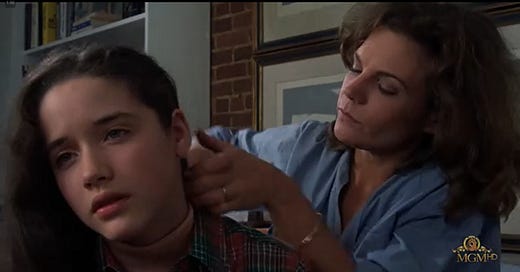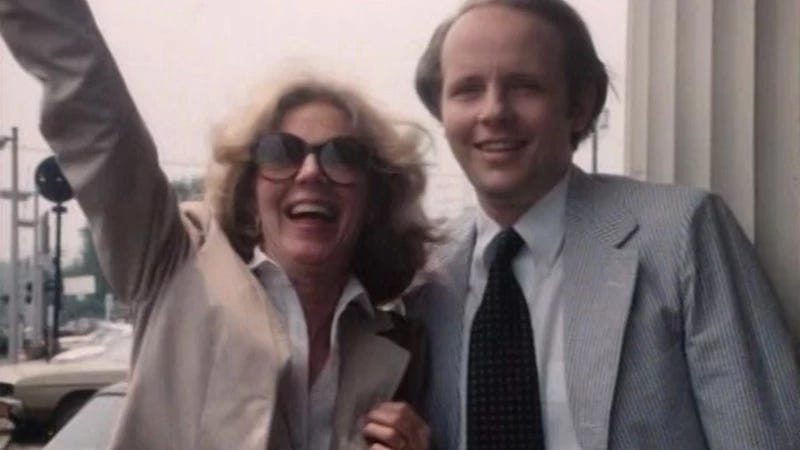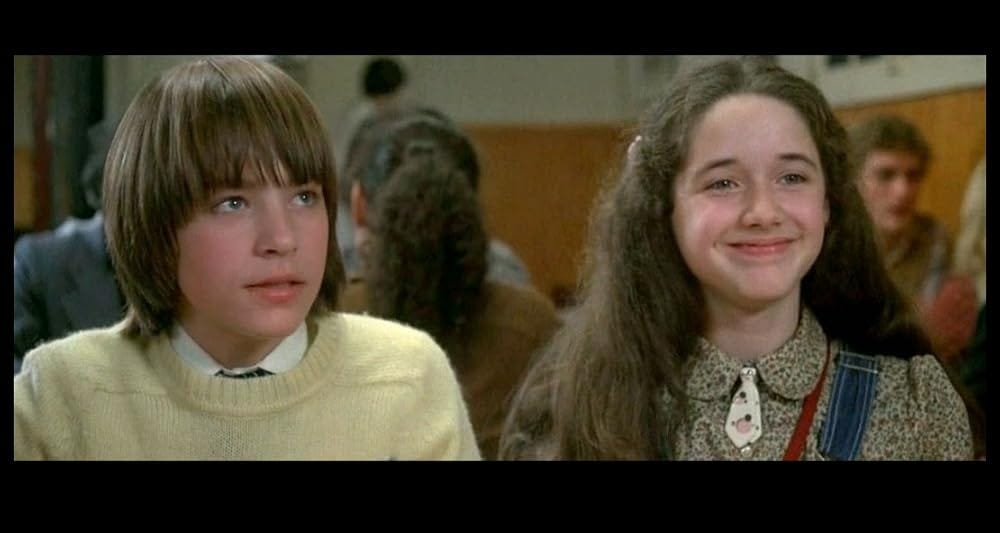Too Far to Go (1979)
Beginning in the 1950s and continuing over the next two decades, John Updike published over a dozen stories in the New Yorker about the couple Joan and Richard Maple, from their early married years (“Snowing in Greenwich Village,” 1956), to their divorce (“Here Come the Maples,” 1976). There was even a late addition, published in 1994, that has the ex-spouses, remarried to other people, interacting around their grandchild.
The stories became the basis in 1979 for a sensitively acted television movie starring Blythe Danner as Joan and Michael Moriarity as Richard. At an hour and thirty-eight minutes, the script by playwright William Hanley can’t capture the Proustian effect of Updike’s two-decade long project, but the movie is affecting. Hanley’s script draws especially on the rending scenes from the stories “Separating,” in which the Maples tell their children that they are splitting up, and “Here Comes the Maples,” which poignantly cuts back and forth in time between the Maples’ wedding day and the court date for their divorce.
The middle third of the movie slumps a bit, with its focus on the couple’s growing sexual disinterest in each other. Yet in the original stories Richard’s determination to be unhappy is just as senseless—though unsparingly anatomized in Updike’s brilliant prose. In order to focus on the marriage, the movie leaves out one of the best stories in the sequence, “Marching Through Boston” (1966), with its portrayal of Joan’s participation in a fashionable 1960s protest, and canny exposure of the boredom and personal shortcomings that move her to do so.
With the Updike characters, and Moriarity’s Jimmy Stewartesque delivery, we feel at points that we are witnessing not one family drama but some x-ray of WASP America. The stories certainly constitute a kind of American marital epic.
Ultimately, the movie, like the stories, is an affirmation: even marriages that come to an end are filled with deep wells of meaning that do not run dry. Updike’s introduction to the assembled chronicle can stand as a motto for the Age of Deuterogamy. “Though the Maples stories trace the decline and fall of a marriage,” he wrote, “they also illumine a history in many ways happy, of growing children and a million mundane moments shared. That a marriage ends is less than ideal; but all things end under heaven, and if temporality is held to be invalidating, then nothing real succeeds.”
The movie thus highlights a vital line from one of the stories, spoken by Richard to his children when they quail at the news of their parents’s separation. “You’re not just the little things we had,” he shouts at them. “You’re the whole point!”
Rich Kids (1979)
From An Unmarried Woman’s look at divorce from the perspective of an affluent woman on New York’s Upper West Side, we shift the focus to divorce from the perspective of two twelve year old children of even more affluent families on New York’s Upper West Side. In Rich Kids, Trini Alvarado plays the daughter of parents who are not divorced, but who pile deceit on deceit in an attempt to hide from her the reality of their dead marriage. Their daughter, says John Lithgow as the father, “is not going to be another unwanted, neurotic victim of irresponsible divorced parents.”
So with his nominal wife’s depressive connivance he sneaks out of the house every night—he’s dating, after all—and back in at dawn, while his daughter records the times of his comings and goings in the back of a copy of The Joy of Sex that she hides in her room. Naturally these poorly disguised absences only exacerbate the daughter’s unhappiness and confusion.
She turns for advice to a schoolmate, played by Jeremy Levy, who is one such “victim of irresponsible divorced parents.” He doesn’t seem to be too neurotic, though, and tries to be a good friend. He explains to her the likely outcomes of her parents’ odd maneovers, and, moreover, has his father’s paradisacal bachelor pad for the two kids to hang out in with no adult supervision.
In the tenderly portrayed unhappiness of its two young stars, Rich Kids is a precursor to Noah Baumbach’s The Squid and the Whale, though Rich Kids is far gentler and sweeter territory. It is, in fact, a combination of farce and pastoral, with all of the parents and their new partners and spouses in search of the two kids, converging on the bachelor pad with its Edenic plants and birds.
At first there is shock: the kids are naked in a bubble bath. But it has been established that there is no sexual activity and, while the scene is an unfortunate choice on the part of the filmmakers, the movie is less interested in prurience than it is in capturing an innocence lacking in the adults. This was the same year that A Little Romance was released, with its 13 year old romantic leads. (Real prurience would come in the following year’s Blue Lagoon.)
Alvarado’s acting is extraordinary, the standout performance of the movie. She and Levy are also period perfect: her in braids, plaid flannel shirt, suede fringe jacket and jeans, her housekey on a string around her neck. Levy, when not in blazer, sports an Izod rugby shirt and his longish hair is chopped in bowl bangs.
Alvarado requires the painful confirmation of her parents’ lovelessness, rather than the limbo in which she is living. On the adult side, her mother, played by Kathryn Walker, must summon up the will to pull the plug on her husband’s charade so that she, and her family, can move into some kind of functional, post-marital existence.
By no means a perfect movie, Rich Kids does not achieve its Shakespearean ambitions. Nevertheless, it should be listed among the better films that inaugurate the Age of Deuterogamy, a comedy that takes seriously the pain of divorce for children. “Did you love each other,” Alvarado asks her mother, “when you made me?”






